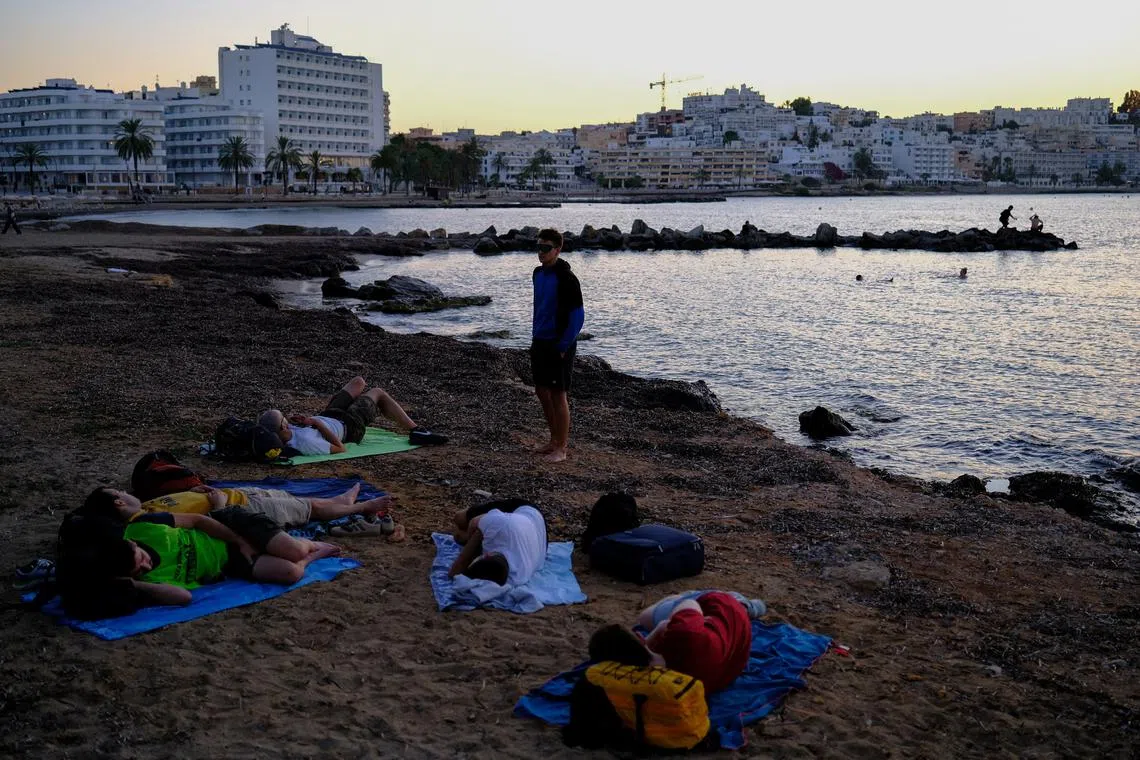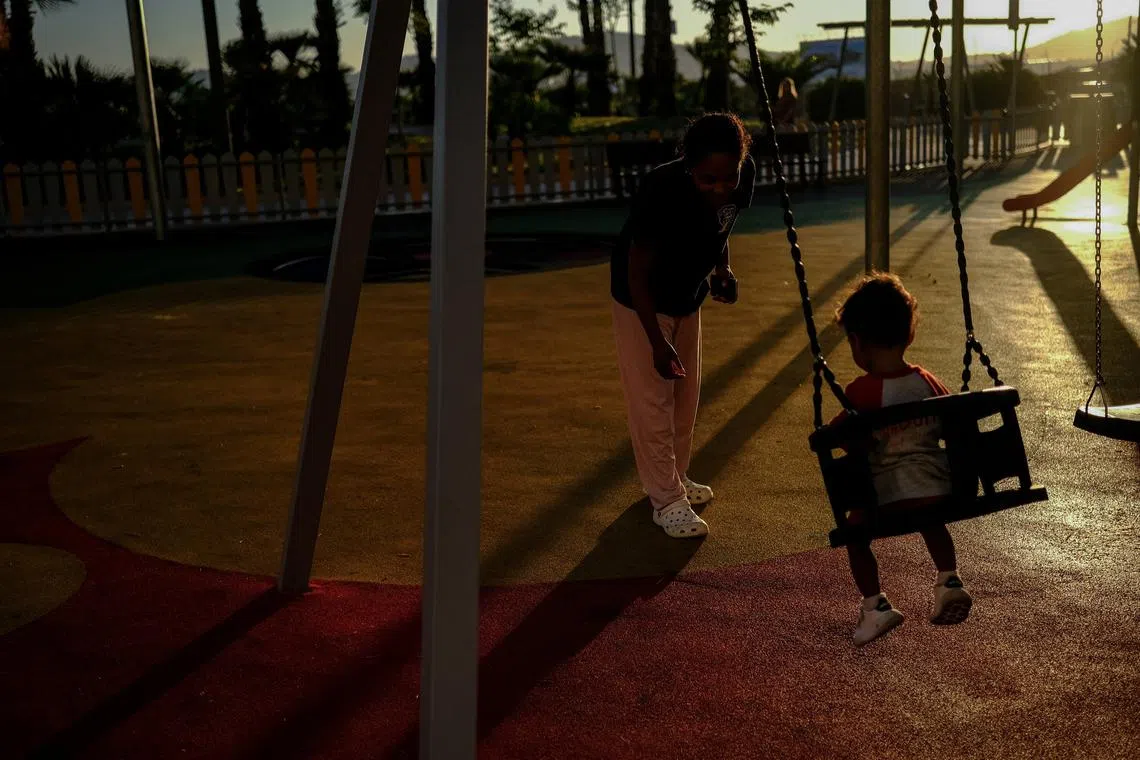Spain’s party island Ibiza suffers housing crunch as rents soar
Sign up now: Get ST's newsletters delivered to your inbox

A housing crisis has forced many locals and seasonal workers to share cramped flats on Spain's party island Ibiza.
PHOTO: REUTERS
SANT ANTONI DE PORTMANY, Spain – It is another night, another party at a hotel in Ibiza. The international clientele dances to the house beat, while laser lights reflect on the curvy swimming pool and on a sea of sunglasses worn after dark at the open-air venue.
Many partygoers wear all-white; some show signs of altered perception. Ask those queuing outside this place and some of the Spanish Mediterranean island’s legendary nightclubs and they will say they are spending a lot but the experience is worth it.
However, behind Ibiza’s clubbing scene and beaches a housing crisis has forced many locals and seasonal workers to share cramped apartments, commute from off the island or stay in tents and motorhomes in unauthorised encampments.
Ibiza’s problems reflect a broader issue in Spain, where a lack of affordable housing in cities and popular coastal destinations has sparked protests to demand rent controls and denounce overtourism. Activists accuse landlords of preferring short-term tourist lets to less-profitable extended leases.
According to a recent study by tourism lobby group Exceltur, the boom in tourist accommodation is growing
Meanwhile, Spain has been looking for ways to restrict the number of homes rented to tourists following a post-Covid-19-pandemic boom in visitors, amid protests by residents, who blame overtourism for a spike in rental or home purchase prices.
The measures seek to push landlords towards longer-term rentals to residents amid a countrywide deficit of 450,000 homes, according to the Bank of Spain.
On Ibiza, nearly 800 people have resorted to living in makeshift settlements, according to local authorities’ figures from 2024, which do not include an estimated 200 who lived in shacks, tents and vans at the “Can Rovi 2” camp before being evicted in July.
“The island is paradise, the most beautiful place I’ve ever seen. But it has a flipside,” said Mr Jeronimo Diana, a 50-year-old water technician from Argentina who stayed at Can Rovi 2.
A normal monthly rent would swallow most of his €1,800 (S$2,700) salary, Mr Diana said.
Ibiza’s average rents peaked at €33.7 per sq m in July 2024, a 23 per cent rise from July 2023, data from property website Idealista shows. That translates to about €1,500 for a small one-bedroom flat. Spain’s national minimum wage is €1,381 per month.
In one possible knock-on effect, Ibiza is seeing a growing shortage of teachers and health workers, according to regional government data. Some public servants commute from neighbouring Balearic islands Menorca and Mallorca.
Ms Maria Jose Tejero, a 24-year-old emergency medical technician, said she shares a small flat with two housemates to make ends meet because the rent is twice her salary.

Emergency technician Maria Jose Tejero, 24, who shares a flat with other health workers, attending to a drunken tourist on a street near Playa d’en Bossa beach in Ibiza.
PHOTO: REUTERS
Crewing an ambulance at night sometimes makes her feel “like a babysitter”, Ms Tejero said. “People come here, drink, take drugs and think life’s just a party when that life can also end.”
Deflated balloons litter a bar-lined street in popular tourist town Sant Antoni. Dealers discreetly inflate the balloons with nitrous oxide – laughing gas – selling the brief high for €5 a pop.
Nitrous oxide is a colourless gas that makes people feel light-headed, giggly or relaxed when they breathe it in. Some people use it recreationally at parties by inhaling it from balloons or small metal canisters, but it can be dangerous if overused.
Ms Lia Romero, a 28-year-old nurse from Spain’s Canary Islands who sometimes moonlights as a dancer at Ibiza club Amnesia, said she also shares a flat and cannot afford bar cover charges or dining out.
“Ibiza is all about posturing and displays of wealth,” she said, “leaving no room for ordinary people.”
According to the regional statistics institute, Ibiza received 3.28 million tourists in 2024, 76 per cent from outside Spain, while the island’s resident population reached a record 161,485.
Mr Jonathan Ariza, a mechanic and construction worker from Colombia who said he is seeking political asylum in Spain, lives in a trailer near the island’s main hospital.
“As long as tourists keep coming, there’ll be people willing to live in precarious conditions to be employed,” he said.
Alejandra, whose last name was not provided, is a 31-year-old Colombian with a residence permit. She now lives in a shelter managed by Catholic charity Caritas after failing to secure a rental. She said she slept in a tent with her three-year-old son David until they were evicted.

Alejandra, 31, from Colombia, playing with her son David, three, at a playground near the Caritas shelter where they live in Ibiza.
PHOTO: REUTERS
Alejandra said she had a new hotel job and wanted to move out of the shelter, but worried about losing work “for being slow” as she raced to log the Social Security contributions required to renew her permit.
Social workers Gustavo Gomez and Belen Torres, who run the Caritas shelter, said landlords routinely discriminate against families with children and evict tenants to replace them with tourists during the more lucrative summer months.
Crackdown on illegal tourist rentals
Local authorities are cracking down on illegal tourist rentals, imposing fines that start at €40,001 on those who post them.
Vacation rental companies have agreed to automatically withdraw advertisements officials deem illegal instead of waiting for a slower judicial ruling, said Ibiza Council vice-president Mariano Juan of the conservative People’s Party, which governs the wider Balearic region.
In Mr Juan’s view, high demand and limited buildable land result in “absolutely illogical” rent prices on Ibiza.
At a national level, the centre-left government has pledged to triple the state housing budget and speed construction of social housing. But a 2023 law that introduced some rent controls has seen limited success, as many opposition-controlled regions decline to apply the rules, given that they have a high level of autonomy in housing policy.
National landlord lobby Asval rejects rent controls, arguing that they shrink supply and raise prices. It says the best ways to bring down rents are public incentives and more construction.
Ms Saray Benito, 32, said work as a contortionist and torch juggler at the famous Cafe del Mar is scarce in winter. Over 12 years in Ibiza, she said she has had to move 20 times and sometimes sleep on balconies.
Italian drag performer Eva Cavallini, who is famous in the LGBTQ-friendly La Virgen district near Ibiza Town’s port, lamented that soaring travel and accommodation costs dissuade other artists from visiting.
“Ten years ago, we were around 200. Now it’s just me – the only survivor here. If things keep going this way, the island is finished.” REUTERS


